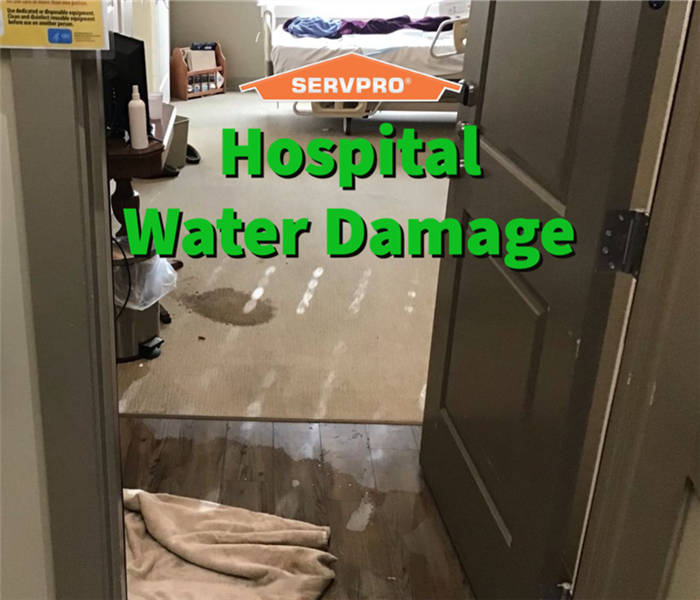5 Great Steps to Respond to Hospital Water Damage
9/20/2022 (Permalink)
Hospital water damage situations require fast action to minimize damage.
Water damage can be a massive problem for any business, but it can be especially devastating for hospitals. Water can ruin equipment, furniture, and even floors and walls. Not only is water damage costly to repair, but it can also lead to mold growth.
Last month the professionals at SERVPRO of North Fulton saw the effects of water damage firsthand in a hospital setting and successfully mitigated the damages. The following blog post will go over how we were able to quickly mitigate the damages at the hospital in five steps.
Common causes of hospital water damage
Hospital water damage is not something to take lightly. There are many common causes of hospital water damage. Some of the most common causes include:
- Burst pipes
- Leaky roofs
- Malfunctioning appliances
- Flooding
Any of these situations can cause extensive damage to a hospital, not to mention the potential for mold growth. Therefore, you want to prepare for any water emergency with a response plan.
Five steps to respond to hospital water damage
Responding to water damage needs to be done quickly and efficiently to minimize damage and prevent mold growth. Therefore, when hospital water damage occurs, the first thing you should do is follow these five steps:
1) Turn off the water source if possible: The first step is to stop the water flow. Turning off the water source may consist of shutting off a broken pipe or closing a valve to prevent further damage.
2) Create a drying plan: Once the water source is shut off, it's time to create a drying plan. The developed drying plan will help to prevent further damage and minimize the potential for mold growth.
3) Remove the excess water: After the drying plan is put together, it's time to remove any excess water. Water extraction can start with a wet/dry vacuum and water extraction equipment. It is essential to remove as much water as possible to minimize damage.
4) Begin drying the area: Once the excess water has been removed, it's time to begin the drying process. The drying process will include the use of fans, dehumidifiers, and other professional drying equipment.
5) Take action to prevent mold growth: In hospital settings, mold growth can be a severe problem. That's why it's so important to prevent mold growth. You will want to ensure that the water restoration company you hired has applied an antimicrobial to the affected areas to prevent mold growth.
Quickly responding to hospital water damage is essential to minimize damage and prevent mold growth. By following these five steps, you can be sure that you are taking the necessary steps to protect your hospital.
Tips for avoiding hospital water damage in the future
Now that you are aware of the common cause and the steps to respond to hospital water damage, you may be wondering how to avoid it in the future. Here are some tips for preventing hospital water damage:
- Check for leaks regularly and repair them immediately: One of the best ways to avoid hospital water damage is to check for leaks regularly and repair them as soon as possible.
- Invest in regular maintenance: Regular maintenance of hospital equipment and appliances can help to prevent hospital water damage.
- Be prepared for storms: If you live in an area prone to storms, it's essential to be prepared. Having a plan in place for how to respond to storm damage can help to minimize hospital water damage.
- Have a professional water restoration company on call: In the event of hospital water damage, it's essential to have a professional water restoration company on call that can quickly respond and mitigate the damages.
Hospital water damage can be a severe problem, but by taking the necessary steps to prevent it, you can help to keep your hospital running smoothly.
Make SERVPRO of North Fulton your go-to water restoration vendor.
As we mentioned earlier, the professionals at SERVPRO of North Fulton have the experience and training to dry out your hospital and prevent further damage quickly. We have a water damage restoration process that we follow which is successful time after time. When you choose to contact us, we will help you with the five critical steps to take when hospital water damage occurs:
- Turn off the water source, if possible.
- Create a drying plan
- Remove the excess water.
- Begin drying the area.
- Apply an antimicrobial solution to avoid mold growth.
As an IICRC-certified firm, we have the knowledge, training, and experience to handle hospital water damage of any size. We understand that hospital water damage can be a severe problem, and we will work quickly to mitigate the damages and get your hospital back to regular operation.
Contact SERVPRO of North Fulton today if you are looking for a commercial water damage restoration company in Atlanta, GA, or the surrounding areas. We are available 24 hours a day, 365 days a year, to help!





 24/7 Emergency Service
24/7 Emergency Service
